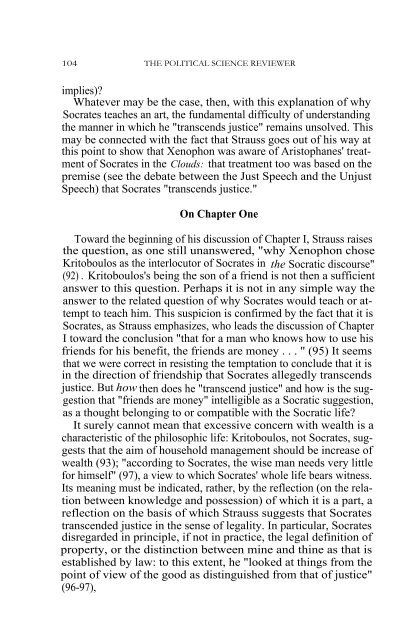Strauss on Xenophon's Socrates Xenophon's Socratic Discourse: An ...
Strauss on Xenophon's Socrates Xenophon's Socratic Discourse: An ...
Strauss on Xenophon's Socrates Xenophon's Socratic Discourse: An ...
You also want an ePaper? Increase the reach of your titles
YUMPU automatically turns print PDFs into web optimized ePapers that Google loves.
104 THE POLITICAL SCIENCE REVIEWER<br />
implies)?<br />
Whatever may be the case, then, with this explanati<strong>on</strong> of why<br />
<strong>Socrates</strong> teaches an art, the fundamental difficulty of understanding<br />
the manner in which he "transcends justice" remains unsolved. This<br />
may be c<strong>on</strong>nected with the fact that <str<strong>on</strong>g>Strauss</str<strong>on</strong>g> goes out of his way at<br />
this point to show that Xenoph<strong>on</strong> was aware of Aristophanes' treatment<br />
of <strong>Socrates</strong> in the Clouds: that treatment too was based <strong>on</strong> the<br />
premise (see the debate between the Just Speech and the Unjust<br />
Speech) that <strong>Socrates</strong> "transcends justice."<br />
On Chapter One<br />
Toward the beginning of his discussi<strong>on</strong> of Chapter I, <str<strong>on</strong>g>Strauss</str<strong>on</strong>g> raises<br />
the questi<strong>on</strong>, as <strong>on</strong>e still unanswered, "why Xenoph<strong>on</strong> chose<br />
Kritoboulos as the interlocutor of <strong>Socrates</strong> in the <strong>Socratic</strong> discourse"<br />
(92) . Kritoboulos's being the s<strong>on</strong> of a friend is not then a sufficient<br />
answer to this questi<strong>on</strong>. Perhaps it is not in any simple way the<br />
answer to the related questi<strong>on</strong> of why <strong>Socrates</strong> would teach or attempt<br />
to teach him. This suspici<strong>on</strong> is c<strong>on</strong>firmed by the fact that it is<br />
<strong>Socrates</strong>, as <str<strong>on</strong>g>Strauss</str<strong>on</strong>g> emphasizes, who leads the discussi<strong>on</strong> of Chapter<br />
I toward the c<strong>on</strong>clusi<strong>on</strong> "that for a man who knows how to use his<br />
friends for his benefit, the friends are m<strong>on</strong>ey . . . " (95) It seems<br />
that we were correct in resisting the temptati<strong>on</strong> to c<strong>on</strong>clude that it is<br />
in the directi<strong>on</strong> of friendship that <strong>Socrates</strong> allegedly transcends<br />
justice. But how then does he "transcend justice" and how is the suggesti<strong>on</strong><br />
that "friends are m<strong>on</strong>ey" intelligible as a <strong>Socratic</strong> suggesti<strong>on</strong>,<br />
as a thought bel<strong>on</strong>ging to or compatible with the <strong>Socratic</strong> life?<br />
It surely cannot mean that excessive c<strong>on</strong>cern with wealth is a<br />
characteristic of the philosophic life: Kritoboulos, not <strong>Socrates</strong>, suggests<br />
that the aim of household management should be increase of<br />
wealth (93); "according to <strong>Socrates</strong>, the wise man needs very little<br />
for himself" (97), a view to which <strong>Socrates</strong>' whole life bears witness.<br />
Its meaning must be indicated, rather, by the reflecti<strong>on</strong> (<strong>on</strong> the relati<strong>on</strong><br />
between knowledge and possessi<strong>on</strong>) of which it is a part, a<br />
reflecti<strong>on</strong> <strong>on</strong> the basis of which <str<strong>on</strong>g>Strauss</str<strong>on</strong>g> suggests that <strong>Socrates</strong><br />
transcended justice in the sense of legality. In particular, <strong>Socrates</strong><br />
disregarded in principle, if not in practice, the legal definiti<strong>on</strong> of<br />
property, or the distincti<strong>on</strong> between mine and thine as that is<br />
established by law: to this extent, he "looked at things from the<br />
point of view of the good as distinguished from that of justice"<br />
(96-97),

















